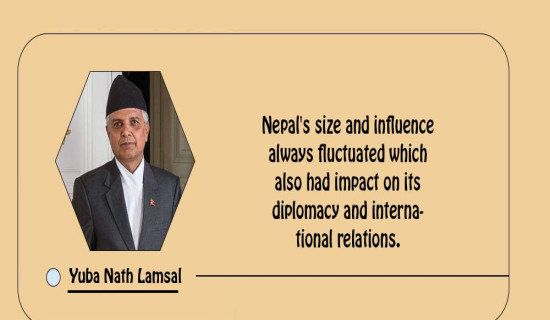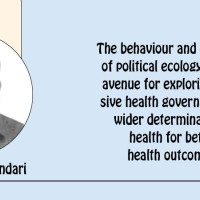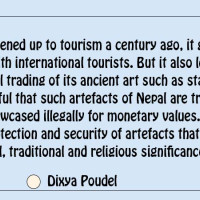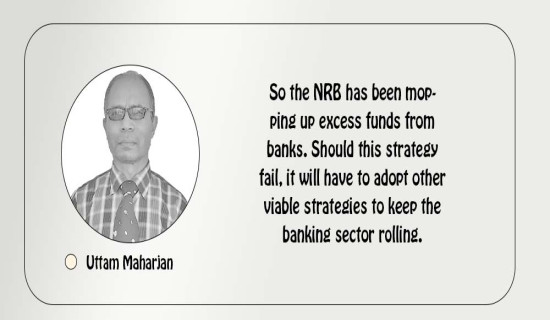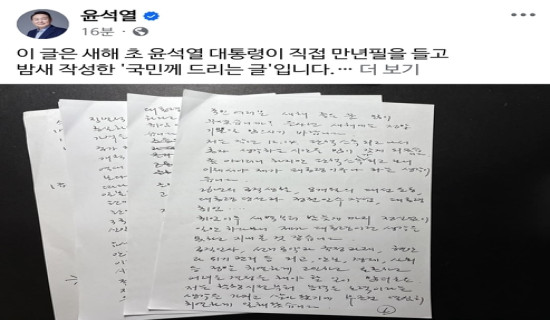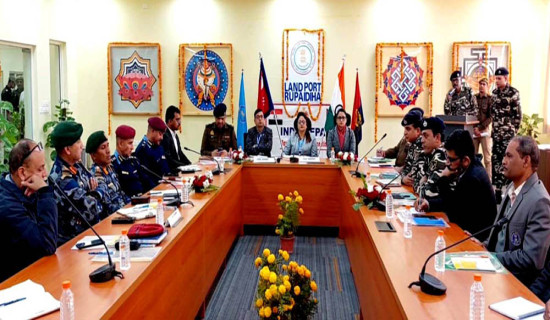- Wednesday, 15 January 2025
Navigating Complex Geopolitical Terrains
Foreign policy is not a linear momentum maintained by predictable diplomatic activities. Foreign policy obligations cannot be met by merely following the directive principles of the constitution, policy guidelines enunciated by the foreign ministry and the terms of references provided to the foreign missions. It is something more dynamic process amenable to constantly changing geopolitical realities. Foreign policy is a vast domain of interaction among states eager to protect their national interest and expand the scope of cooperation based partly on long-held theoretical tenets and partly on emerging context of changing international politics. It is a dynamic process driven by a number of constant and variable elements. It is not a stagnant philosophy but a guide to action whose trajectory is shaped by both the durable values and emerging realities.
The constant factors of foreign policy often form the bedrock on the basis of which strategies are formulated to achieve foreign policy goals. These factors are the lodestar which helps a nation to stay in course while navigating the intricate power play of international power players. Foreign policy is anchored on certain abiding principles but it must also always remain responsive to contemporary international dynamics to maintain a steady course through the chaotic landscape of global politics. If we fail to respond to emerging challenges and remain stuck in a rut of conventional notion of meeting routine policy obligations, we will find ourselves on the wrong side of the fence lost and forlorn in the game of winning initiative and score advantage.
Emerging dynamics
Constant factors keep a nation anchored to the vision, mission and general objectives of its foreign policy but they hardly provide capacity to correctly respond to exigencies. We should, therefore, always stay tuned to catch early signals of emerging dynamics. It is the variable factors that waylay us, ensnaring policies into traps and inducing us to take hasty decisions. Variable factors always play critical role in defining foreign policies of a nation. There is more than one element that effects prioritisation of policies. The economic instability, security challenges, climate chance, labour migration, regional and global conflict, obstruction in trade and emerging power alignment are some of the variable factors that play crucial role in prioritising foreign policy responses. It is always important to remain watchful and vigilant to detect the shifts in these variables in order to be able to make correct decisions.
There is a tendency among the poor and developing countries to remain indifferent to emerging fault-lines in the geopolitics and react in haste when crises emerge without weighing in the repercussions and long-term consequences. In order to be in a position to take prudent decision in times of emergency, governments must remain receptive and anticipate situations that may impinge on their economic interests or pose security challenges. In the present day inter-connected world, global issues cannot be viewed in isolation. Climate change in one region may inevitably affect the life of the people in another place, hindering their access to water, food and other resources.
Governments can help communities to make more resilient and better prepared to organise a flexible responses to emerging issues by remaining watchful to changing context. If evolving crisis scenarios are under our radar, we will not be taken off guard and find ourselves in a position to formulate coping strategies. We are living in a world marked by multipolarity with a number of aspirant superpowers competing with each other for expanding sphere of influence, power dominance or control over critical economic resources. Various conflict hotspots have emerged in the world. Russia-Ukraine conflict is on the brink of spilling over Europe with devastating consequences. The Israel-Hamas war is threatening to escalate into a multipronged war involving various ethnic, religious and geopolitical rivals.
If a major war breaks out in West Asia, which now appears more than likely, many labour source countries of South Asia, South East Asia and Africa including Nepal will be caught into an unprecedented security and economic crisis. There are 2.7 million Nepalis living and working in various West Asian employment destinations. If a regional war breaks out disrupting construction, service industries, production, trade and transport, a great humanitarian crisis may overtake a large migrant population. This scribe remembers the chaotic situation of 2019 /2020 when millions of workers had to be evacuated from the Gulf region to protect them from the disruptive impact of COVID-19 pandemic. About 40,000 Nepali workers had to be evacuated from Qatar alone, 12, 000 through chartered flights and 28,000 through regular flights when international flights resumed.
Clouds of war
Are we prepared to air-lift even one-fourth of the 2.7 million people if widespread war or armed conflict breaks out in the region, which now appears likely? The Houthis have been inflicting an unprecedented disruption in international shipping business by targeting commercial and battle ships in the Red Sea. If the Houthis continue to disrupt international sea transport for a longer period, there will be a global scarcity of essential commodities, inflation will skyrocket and job market will shrink with resultant decline in remittance flow. Have our foreign policy experts anticipated this scenario and warned the government to take proactive steps towards organising response?
Diplomacy, negotiation and dialogue are the cardinal tools for addressing conflict and restoring peace. But the tendency to compete for acquiring cutting-edge weapons and targeting opponents with them has become widespread. The geopolitical landscape is turning ever more dreary and threatening clouds of war are hanging low on the horizon. In this situation, tracking unfolding events and adapting to changing global realities is crucial. Only by staying alert and equipping our institutions with tools of proactive actions can we properly navigate the complex geopolitical terrains of the present day world and make informed and pragmatic decisions to protect our national security and the life of the people caught in unfortunate cycle of international conflict.
(Dr. Bharadwaj is former chairperson of Gorkhapatra Corporation and former ambassador of Nepal to Qatar.bharadwajnaradgmail.com)



